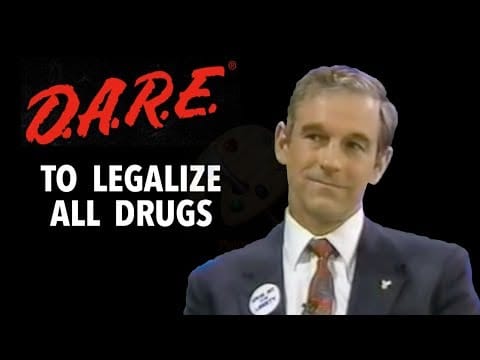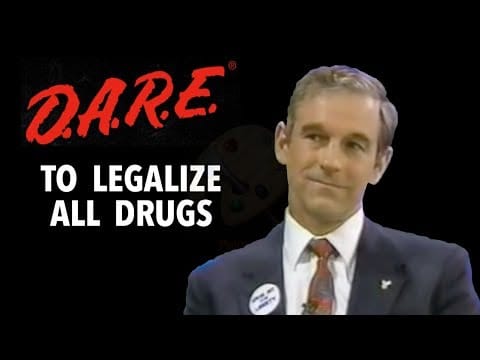
Ron Paul Institute (RPI) Senior Fellow Adam Dick’s prepared comments for RPI’s May 18, 2019 Houston, Texas conference “Winning the War on the War on Drugs”:
Ron Paul helped many people discover libertarian ideas in his presidential campaigns. For me, during Dr. Paul’s 1988 presidential campaign, things worked the other way around. I was already familiar with libertarianism. And that familiarity led me to learn about Ron Paul.
When Dr. Paul came through San Antonio, Texas in that campaign, I went to find out more about this man who was seeking the presidency under the Libertarian Party banner. Dr. Paul, that evening, presented an informative and interesting extemporaneous exploration of current events and his approach to them rooted in libertarian ideas.
One of the things I valued most from the event was a pamphlet written by Dr. Paul that I brought home with me. That pamphlet, titled The Case for Drug Legalization, presented a strong, multifaceted argument for drug legalization that has held up well over the ensuing decades.
It was an argument that Dr. Paul was bold to present in his 1988 presidential campaign. 1988 was eight years before California voters approved Proposition 215 for legal medical marijuana that gave a big boost to rolling back marijuana prohibition across the country, a process that continues forward yet remains far from completion. 1988 was also at the end of two terms of President Ronald Reagan, an adamant drug warrior who helped expand the drug war in America with bipartisan support in Congress.
Ron Paul, in arguing for drug legalization in that election, was also challenging the general public attitude. A Gallup poll placed support for marijuana legalization at 66 percent countrywide in October of last year. In contrast, support was at under 30 percent in Gallup polls nearest to 1988. Back then, Gallup did not poll each year regarding marijuana legalization. Why bother? Legalization would not be happening anytime soon. Of course, a smaller minority of Americans back in 1988 supported the more radical proposal of legalizing all drugs.
But, there was Ron Paul in his 1988 campaign proclaiming in San Antonio and in campaign stops across the country that the entire drug war should be terminated. To boot, one of the handouts from the campaign was the extensive pro-legalization pamphlet. That pamphlet helped show me and other people that Dr. Paul was the real deal as a supporter of freedom.
Indeed, one of the most important things Dr. Paul did early on in his pamphlet The Case for Drug Legalization was emphasize that ending drug prohibition is, as he put it, “a policy based on the American tradition of Freedom.” Sure, there are plenty of pragmatic reasons for legalizing drugs, several of which Dr. Paul discussed in his pamphlet and on the campaign trail. But, fundamentally, the case for drug legalization is a case for respecting people’s freedom.
This emphasis on freedom is principled. It also is likely critical to the ultimate success of any effort to completely end the war on drugs. Consider marijuana legalization which is now the law in one in five American states. Practical arguments have helped bring about that legalization. But, I believe that the biggest driver for legalization has been people developing the opinion that, whether they think it is the right choice or not, the freedom of other individuals to use marijuana should be respected by government.
Dr. Paul’s freedom case for ending the drug war extends beyond emphasizing that the freedom to use drugs should be respected. Ron Paul wrote in his campaign pamphlet that what the government was really doing in the drug war was “assaulting civil liberties in the name of fighting drugs.” Ron Paul was declaring in his 1988 campaign what many more people have come to accept in the years since: The war on drugs is a war on people.
Some of the drug war abuses Dr. Paul detailed in his pamphlet are “bank surveillance that has sought to make every teller a monetary cop,” the construction of dossiers of innocent Americans, and seizures of property such as boats and cars when any illegal drugs are found in them.
Such rights abuses in the name of the drug war have continued and intensified in the years since. But, we have also in recent years seen an uptick in criticism of many drug war practices and even the implementation of restrictions on their use, especially at the state and local level.
One powerful story Dr. Paul tells in his pamphlet is of a family victimized by a SWAT team raid of their apartment. The brutal and destructive raid was justified by a false tip from an informant that drugs were present in the apartment. This is a story that has become more and more common over the years.
Eastern Kentucky University Professor Peter B. Kraska, testifying at a hearing of the United States Senate Homeland Security and Governmental Affairs Committee in 2014, identified the late 1980s to early 1990s as the period in which the growth in use of SWAT teams took off in America. The result, he states, is “more than a 1,300 percent increase in the total number of police paramilitary deployments, or call-outs, between 1980 and the year 2000.” Much of this growth is due to the drug war. And, while SWAT team raids of the wrong homes are terrible, so also are SWAT team raids on homes of people who do possess illegal drugs.
You could say Dr. Paul was ahead of his time in criticizing SWAT team raids. He was similarly ahead of his time in condemning in the pamphlet that an elderly widow was “thrown in jail for possession of four marijuana plants,” despite her doctor saying she needed to use marijuana to deal with her glaucoma. Back in 1988, there was little common understanding of the medical benefits a variety of people obtain from using marijuana. Stories like the one Dr. Paul told would often be met with answers such as, “You just say that because you want to get high.” Boy have things changed. And they have only done so because people like Ron Paul, a doctor as well as a political candidate, were willing to stand up and publicly defend the medical use of marijuana, leading the way to the situation now where medical marijuana is legal in two-thirds of the states and overwhelmingly supported by the American people.
Dr. Paul also addressed head-on in his 1988 campaign pamphlet some of the ulterior motives behind the drug war in America. He sought to educate people so they would not just accept the line that any negative consequences of the drug war were a necessary byproduct of a well-meaning government effort to keep Americans safe.
Ron Paul bluntly stated his general opinion for why the US government was pursuing a drug war. Dr. Paul wrote that he believed part of the reason “the drug hysteria was whipped up” was “to strengthen big government’s hold over us.” Measured against this goal, Dr. Paul explained, the drug war had been a great success, with accomplishments including a huge increase in the American prison population and a catalogue of liberty abuses undertaken in the name of enforcing prohibition.
But what of the purported compassionate goal of the drug war to prevent people from, via drug use, ruining their lives and the lives of others? Rubbish, answered Dr. Paul, asserting in his pamphlet that drug abuse rates were about the same in 1988 as in 1888, a hundred years earlier and decades before drug prohibition. Indeed, we have witnessed with the ending of alcohol prohibition countrywide last century and of marijuana prohibition in some states over the last few years that no big rise in use of the previously prohibited products materialized.
While prohibition had failed to reduce drug use, it had, Dr. Paul explained, managed to bring about much greater danger for Americans through a resulting rise in rates of property and violent crimes. And the drug war created additional dangers for illegal drug users. Dr. Paul notes in his pamphlet:
The major cause of death is not from drugs’ narcotic properties. It is from poisoned drugs and adulteration.
That danger, wrote Dr. Paul, “is 100% Made in Washington.”
Today politicians and commentators are calling for expansion of the drug war to counter the danger of fentanyl, an adulterant and another danger 100 percent made by government. Legalize drugs and the problem disappears. Here is how I put it in an October of 2017 Ron Paul Institute article:
With legalization, people could buy their drugs from established businesses that have a strong interest in maintaining a good reputation, can be sued for fraud and other wrongful acts, receive their drugs through regular supply chains not interrupted by government interdiction efforts, and sell drugs that are of consistent quality and thus have much more predictable effects when consumed.
Dr. Paul has long known that respecting freedom is inconsistent with fighting a drug war. But, he did not leave the matter at that. Dr. Paul investigated deeply and widely to develop expertise in the many facets of the prohibition debate. Indeed, in his 1988 campaign pamphlet alone he discussed in detail several additional facets of that debate that I have not mentioned here. Further, Ron Paul has taken the initiative over the years in campaigns, in the United States House of Representatives, and through private educational efforts, including with the Ron Paul Institute, to advance the case for drug legalization.
As we look at the success that has been made in rolling back marijuana prohibition and consider the potential of ending the entire drug war, we should be thankful for Ron Paul’s effective communication over the decades of a well-reasoned case for drug legalization. His efforts are a major factor contributing to how far we have come and how much we may yet accomplish in the war against the war on drugs.

